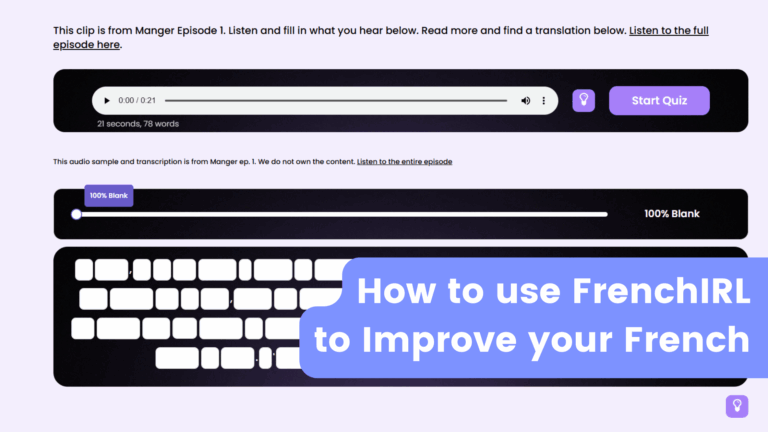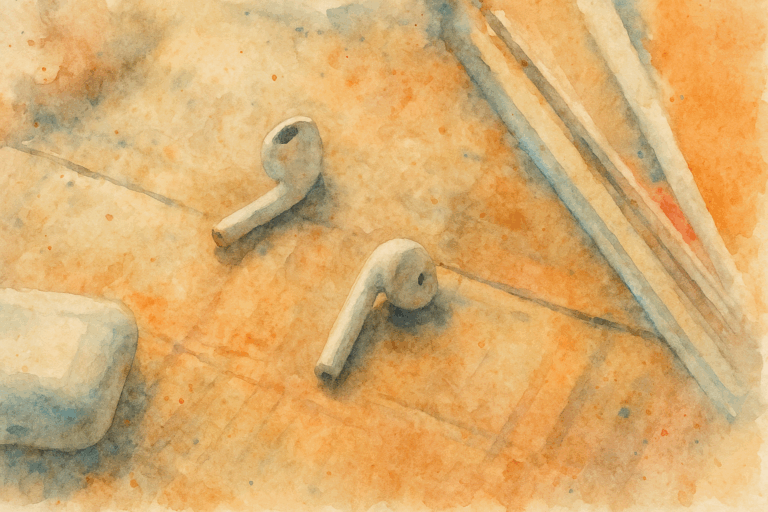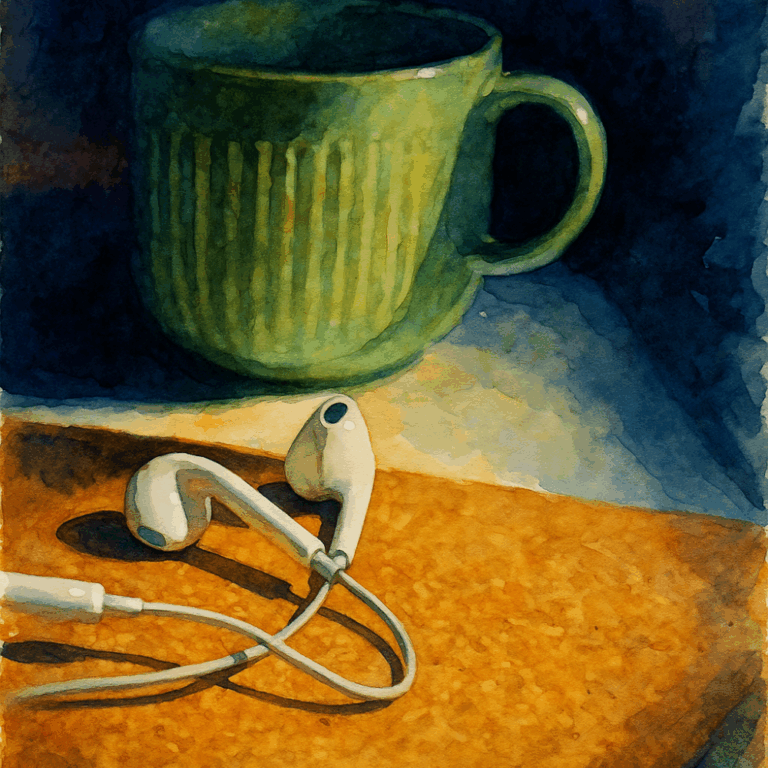Your (French) Accent Isn’t Fixed—It’s A Choice
Think you “can’t do accents”? You’re literally doing one every time you speak. Any language. Here’s how to unlock the French accent that’s been hiding in your voice all along.
Jump to:
- The Accent Prison: Why You Think You’re Stuck
- The Accent Myth: “I’m Just Not Good With Accents”
- The Voice Laboratory: Your Mouth as a Playground
- The Listening Revolution: Stop Hearing, Start Listening
- Mirroring: Copying Without Shame
- More Than Just Sounds
- Breaking Through the Psychological Barriers
- The Daily Practice: Your Accent Workout Routine
- The Three-Step Revolution That Changes Everything
- Have Fun
- Your Challenge: The 5-Minute Accent Revolution
The Accent Prison: Why You Think You’re Stuck
“You think you ‘can’t do accents’? You’re literally doing one right now.“
Every time you speak, you’re choosing an accent. Right now, you’re using your regional American accent, or your British accent, or whatever linguistic flavor you’ve unconsciously adopted. But here’s what nobody tells you: your accent isn’t your identity—it’s just a habit.
This is easy for me to say. I pride myself on an unplaceable American accent. I have always loved accents. Growing up in Wisconsin I played with my voice to sound like I was from “up nort’” or to have the same twangs we might associate with Fargo or Bobby’s World—the Minnesota accent which is similar to Wisconsin’s.
I continued playing with my voice when we traveled, matching my voice and rhythm to the accents I heard in Rome. Or returning from Australia with phrases to jumpstart speaking with Australian outback twangs.
When I lived in Beijing, I did everything I could to make my accent sound more Beijing. Adding “r” sounds to ends of words where appropriate, swallowing words, commonly shortening phrases—all demonstrative of the capital city. This was all fine until I met my wife. She did not approve of my Beijing growl and I decided I would change it.
I found a great Taiwanese TV show called “In Time With You.” Loved the main actor’s accent and copied his voice to mimic a Taiwanese accent. And here we are, 12 years on. I am still able to bring out the Beijing accent, typically when I’m with Beijingers, but I prefer to speak Chinese in my Taiwanese accent.
I always thought I was good at accents, others told me I was good at accents. But now I wonder—maybe it’s just the work that I put into them. And this makes me wonder: what if it isn’t about talent—it’s about permission to play.
The Accent Myth: “I’m Just Not Good With Accents”
This is the biggest lie we tell ourselves about language learning. When you say “I’m just not good with accents,” I want to challenge you, what you’re really saying is “I’m just not willing to play.” Here’s what I realized in my own life: being told from a young age that I was “good” at accents gave me permission to play.
Let’s give yourself permission to play. So, the question isn’t: “Why can’t I do accents?” It’s “Why am I not playing with my voice as an instrument?”
I’ve spent my life playing with my voice. If you have ever pretended to whine for dramatic effect, or talk to a puppy in a funny voice, or put on your baby voice for you niece, nephew or grandchild—well, all of those are probably different voices.
The difference? We need to let our guard down. When I lived in Beijing, I had the role of the Chinese speaker. I didn’t want to sound like a foreigner speaking Chinese. I wanted to sound like a local and I took that on as a persona. It wasn’t me out there anymore, I could make mistakes and play with how I sounded.
The Voice Laboratory: Your Mouth as a Playground
I grew up playing piano and sang some in high school and college and did a bit of theatre. All of these things helped me realize that my voice is something I can play with. I can change it for a character, for a song—I can control so much.
Your voice isn’t a fixed instrument—it’s an instrument waiting to be used.
Try these exercises and change your perspective
Alright, now this next part is crucial, when you’re alone—no audience, no judgment, start playing with your instrument:
Explore your range:
In singing we speak of a head voice and a chest voice. It’s time for you to discover yours. Move your sounds up and down. Start from your chest (deep back into your throat and lower), then make it from your head (this will take you up through the nose and into a falsetto or high airy voice), then back to your throat and normal speaking place.
One thing I remember about playing with accents: someone told me that Americans speak from their throat, Europeans speak from their mouth. You can play around with saying the same thing from different places. Say it gravelly or deeper back in the throat. Now move it to your nose. Notice how your sound is changing.
Notice the shape of your mouth and tongue:
My first Chinese teacher used to hold out his hand, palm up, then curl his fingers while saying certain words. He was helping us visualize what his tongue was doing in his mouth. This visual combined with the audio really helped me. I learned how to roll my “r’s” like a Beijinger does.
Say the same syllable while shifting your lip position. Change how far your lips open. Can you keep them from moving and see how that changes things? Be more emphatic with your tongue. Make it do more. Then make it do less while saying the same things.
The goal of this is to really explore what sounds your mouth can make. Understand there are opportunities to produce all kinds of different noises from the air passing through your nose and mouth.
Play with resonance: Feel where different sounds vibrate in your body. Is it in your head? Is it in your chest? How loud are you, how does volume change the sound? My French speaking voice is far quieter than my English speaking voice. My Taiwanese Chinese is far softer than my Beijing accent. These are cultural elements, but they can be part of your accents.
Record everything: Alright, this last piece I don’t always do. It might help you really hear the different voices and sounds you’re able to make. Take credit for the different noises and the practice you’re making.
It’s been years of practice for me, from a young age imitating and listening to WI accents, then accents when we traveled, and then learning about my voice as an instrument in stage and music. It takes time, and it’s achievable.
The goal of this practice above is to get really comfortable using your voice as an instrument. And hearing your words make different sounds. If you’re not making new sounds, then really let go, play with it. Have fun.
The Listening Revolution: Stop Hearing, Start Listening
When I’m learning a language I often find I’m listening to what someone says rather than how they’re saying it.
Stop listening for the words only. Absorb and be the sound. It might sound silly, but this is part of listening and improving our accent and natural abilities in our target language.
The Audio Clip Challenge
Take on the daily quiz. After you’ve finished the quiz, or before you start try this:
- Listen without reading any transcript
- Focus purely on the sound patterns
- Notice how the voice moves through the words, does it change to different registers? Is it in the head, chest? Throat?
- Pay attention to where sounds resonate in the speaker’s body
- Again, we’re listening to the sound NOT the words. Don’t worry about vocab, grammar, tenses; just listen to the rhythm and sound the speaker has.
Try this right now: you can listen to “Bonjour” in clips here, or here, or here. How are they different? Even with the same speaker there different sounds.
Mirroring: Copying Without Shame
This is where the magic happens, and it’s also where most people chicken out.
Let go of “your” voice temporarily.
Find a speaker you like. I’m a guy, so Inner French is a great option. Or Simon in Manger’s episode 1.
- Listen first, understand later: Get out of your head. We’re not going for understanding, we’re not trying to analyze anything. We’re just listening.
- “Mirror” or copy what you hear: In real time, as you’re listening, use your voice to match the same sounds you’re hearing. Don’t try to get it right, just listen and try to mimic the sounds.
- Embrace the weirdness: You’re going to feel silly. Laugh and keep going. Play with each word. If you hear something you like say it a couple times until what you’re saying matches the voice you thought you heard. Keep trying it.
- Record everything: Recording can be a good idea if you want to hear how you’re doing. It’s not necessary, I have not recorded myself, yet! The practice itself is just for your ears and your vocal instrument. If you can speak and hear and try to match without recording, you’ll be fine!
The Identity Shift Moment
Let go of the voice you think is yours and embrace what could be a French voice for you. This should be a fun practice and a chance to really explore how your voice and range make anything possible, including authentic accents.
Too hard with French? Try it with your native tongue first. Play with copying the sounds you hear in English as or right after you hear them. Find a speaker with a unique voice and try to mirror their sounds. If you’re from the NE, try to play with a Matthew McConaughey Texas accent.
More Than Just Sounds
Alright, now the twist: Accents are more than just sounds. “Wait, but you said…” Yes. Sound is almost all of it, but for the final bit, a flawless accent will need to incorporate cultural nuance gained with constant exposure.
These are the ways of speaking: The idioms. The shared experience of growing up in the language (cultural references, jokes, historical cultural memes—consider in the USA nuance from Super Bowl halftime shows, or cereal advertisements of our youth). All of that goes into what is said and how it’s said.
The sound your mouth makes does matter, it takes you almost all the way there. Your wordchoice and cultural understanding will take it to 100%.
In reality, we don’t need to get there, though.
Let’s just stick with the sounds. I assert that having an accent that blends with native speakers in your target language can be a big assist for fluency, communication, and ease.
You’ll put others around you at ease, making forming relationships easier and bonds stronger. People will give you the benefit of the doubt, too. With a natural accent, you’ll be able to communicate further with the same level.
Here’s Proof That Accent Matters More Than Vocabulary
I do not speak Italian. I know a good amount of vocabulary from days learning Latin and Spanish and now French. I can guess what the word in Italian is based on these three languages. Before my last trip to Italy I had heard that Italian requires all syllables to be the same length. I tried that on my last trip to Italy—focusing solely on matching Italian rhythm. At least three times the people I was speaking with assumed I was fluent in Italian. I had to deny it and they persisted.
The only real change was my accent. Same vocabulary, different accent, completely different reaction. I wasn’t making a mockery, I was imitating from flattery—I wanted to sound like a local.
Breaking Through the Psychological Barriers
I want to say this is probably easier for me given my past: my love for stage theatre, experience singing (actually using my voice as an instrument), and exposure to so many different languages and sounds.
Yes, and: I believe everyone can have access to using their voice as an instrument and connecting deeper with those in their target language. It’s available, we just have to let go.
Let go of believing you have a set accent. Wonder if your accent is a choice, no matter your accent.
Start simply, be alone and just play with how you can speak your native language. Try the mirroring exercise in your native tongue.
The Daily Practice: Your Accent Workout Routine
Consistency beats perfection. Here’s your daily accent laboratory:
Morning Voice Exploration (5 minutes)
- Play with your vocal instrument on your morning commute
- Wake up your voice with extreme sounds,
- Practice moving resonance around your body
- Record yourself saying the same phrase in different “voices”
Midday Mimicry (10 minutes)
- Find authentic French audio, plenty of resources across the web and this site.
- Listen to one sentence on repeat (just hit start quiz on this site)
- Copy not just words, but the entire vocal pattern, make your voice sound like what you hear.
Evening Review (5 minutes)
- If you recorded, listen to your recordings. Practice in your own language making your voice sound like somethign else.
- Recognize your progress and what you’re doign.
- Celebrate weird sounds you never made before
The Three-Step Revolution That Changes Everything
Step 1: REALLY Listen
Stop listening to content. Start listening to sound architecture. How does the voice move? Where does it resonate? What’s the mouth doing?
Step 2: Your Voice as Instrument
Explore every sound your voice can make. Weird is good. Uncomfortable means growth.
Step 3: Mirror & Release
Copy shamelessly. Let go of your “real” voice. French accent when speaking French isn’t performance—it’s accuracy.
Have Fun
In France, I always drop in a “excuse my French, I’m learning”. With my accent I usually get in response: no, you’re nailing it. I am always listening. I’m listening for voices I love and want to sound like.
I haven’t chosen a region. The other day I was asked “what region are you from? I can’t really … tell?”
My mish-mash, hodge-podge of French accents is fun for me to play with, but might not develop the same connections that my Chinese accents can. I may need to explore choosing one person, one Caesar-ed star, and modeling my accent on theirs. But that’s a story for another day.
For now, have fun. Get to a point where you hear what came from your mouth and you stop and wonder: “Did I just say that?”
Yes. You did. Because that voice was always there, waiting for permission to come out.
Your Challenge: The 5-Minute Accent Revolution
Right now, before you finish reading this:
- Find a private space
- Say “bonjour” ten completely different ways
- Record yourself attempting one French phrase with full commitment
- Listen back without judgment
Share your recording if you’re brave enough—or keep it as proof that your French accent was never missing. It was just hiding.
Your accent isn’t fixed—it’s a choice you make every time you speak. Choose French sounds when speaking French. Your voice is more flexible than you think, and your French accent is already there, waiting for you to stop protecting your “real” voice and start playing with all the voices you actually have.
Ready to unlock your French accent? Start today’s audio challenge and discover the voice you never knew you had.







